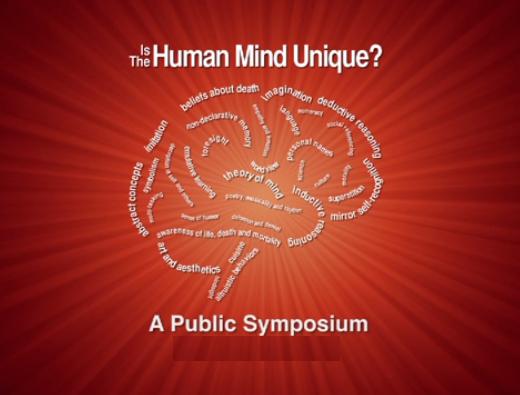Is the Human Mind Unique?
Scientists from many different fields gathered to discuss cognitive abilities often regarded as unique to humans including humor, morality, symbolism, creativity, and preoccupation with the minds of others. Emphasis was placed on the functional uniqueness of these attributes, as opposed to the anatomical uniqueness, and whether these attributes are indeed quantitatively or qualitatively unique to humans. (from carta.anthropogeny.org)
 |
Symbolic Communication: Why is Human Thought so Flexible?
Although many features of human brains can be attributed to selection for novel cognitive functions, relaxation of selection on other attributes has additionally contributed to de-differentiation of certain brain functions.
Desperately Seeking Explanation
In this talk, Daniel Povinelli (Univ of Louisiana at Lafayette) suggests that "desperately seeking explanation" is a uniquely human mental function.
An Evolved and Creative Mind
Steve Mithen (Univ of Reading) discusses what the archaeological and fossil records tell us about the similarities and differences between the minds of Homo sapiens and Homo neanderthalensis.
Humor
Why does humor exist at all? It consumes a lot of time and energy, and some humans are arguably addicted to humor.
Archaeological Evidence for Mind
The genetic basis of humankind was established 200,000 years ago, and yet the tectonic phase of human development is only 10,000 years old.
Entering the 'Soul Niche'
Human beings are animal-machines with added souls. This was famously Descartes' view, and it's the view of a good many people today.
Skilled Performance and Artistry
Merlin Donald (Queen's Univ) opines that if one crucial adaptation had to be singled out as the signature move that started the human journey, he would nominate "mimesis," or body artistry.
Moral Sense
Morality is a social behavior seen in mammals, and some birds, which depends on an interlocking brain organization shaped by four factors.
Inter-Modular Interactions, Metaphor, and the 'Great Leap'
V.S. Ramachandran (UC San Diego) argues that human mental uniqueness emerged from the fortuitous co-emergence of certain novel anatomical structures and functions and equally fortuitous synergistic interactions between them.
| Related Links |
| The Human Mind This is a three-part BBC documentary series presented by Robert Winston, exploring all aspects of the human mind - from how we learn, to how we're able to recognise faces and what makes one person 'click' with another. |
| Brain Story This is a BBC documentary series presented by Susan Greenfield, revealing the basic brain processes that lie behind all aspects of human experience. |
| Mind Reading: Human Origins and Theory of Mind Most humans are able to understand their own mental states and that of others through verbal and nonverbal forms of communication. This "Theory of Mind" allows us to understand one another, in a sense - to read minds. |
| Becoming Human: Unearthing Our Earliest Ancestors This is a three-part NOVA's documentary series investigating the recent discoveries transforming our understanding of our human origins. |
| Origins of Genus Homo This symposium explores evidence bearing on the emergence of our genus, focusing on possible antecedents to Homo, changes in diet and body form as Australopithecus evolved toward Homo, ancient species within the genus, and evolutionary processes likely operating 2.5 - 1.5 million years ago. |
| The Day We Learned to Think There is one thing fossils cannot tell us; at what point did we stop living day-to-day and start to think symbolically, to represent ideas about our environment and how we could change it? |
| Human Origins: Lessons from Autism Spectrum Disorders This symposium features scientists from many diverse fields, including genetics, neuroscience, psychiatry, cognitive science, psychology, and evolutionary biology, who shared their insights into ASD. |
| Introduction to Psychology Providing a comprehensive overview of the scientific study of thought and behavior, this course explores topics such as perception, communication, learning, memory, decision-making, religion, persuasion, love, lust, hunger, art, fiction, and dreams. |